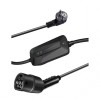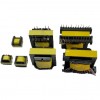Order of the President of the People’s Republic of China
(No.15)
The Foreign Trade Law of the People’s Republic of China was amended and adopted at the eighth meeting of the Standing Committee of the Tenth National People’s Congress on April 6, 2004.The amended Foreign Trade Law of the People’s Republic of China is hereby promulgated for effect as of July 1, 2004.
Hu Jintao, President of the People’s Republic of China
April 6, 2004
(Adopted at the seventh meeting of the Standing of the Eighth National People’s Congress on May 12, 1994; amended at the eighth meeting of the Standing Committee of the Tenth National People’s Congress on April 6, 2004.)
ChapterⅠ General Provisions
Article 1 The present Law is enacted for the purpose of broadening the opening to the outside world, developing foreign trade, maintaining the order of foreign trade, protecting the lawful rights and interests of the foreign trade business operators, and promoting the healthy development of the socialist market economy.
Article 2 The present Law applies to foreign trade and the protection of foreign trade related intellectual property.
The term “foreign trade” as mentioned in the present law refers to the import and export of goods, technology, and the international trade of services.
Article 3 The administrative department of the State Council in charge of foreign trade shall take charge of the nationwide foreign trade according to the present Law.
Article 4 The state practices a uniform system of foreign trade, encourages the development of foreign trade, and maintains an order of fair and free foreign trade.
Article 5 The People’s Republic of China promotes and develops foreign trade relations with other countries and regions, concludes or accedes to regional economic and trade agreements such as customs or tariff union agreements, free trade zone agreements, etc., and joins regional economic organizations according to the principle of equality and reciprocity.
Article 6 In the field of foreign trade, the People’s Republic of China grants, according to the international treaties and agreements it concluded or acceded to, most favored nation treatment or national treatment to other contracting parties or members, or grants most favored nation treatment or national treatment to its counterparts according to the principle of mutual benefit and reciprocity.
Article 7 For any country or region that takes discriminatory banning, restriction or other acts against the People’s Republic of China in terms of trade, the People’s Republic of China shall be entitled to adopt, in accordance with the actual circumstances, corresponding measures against them.
ChapterⅡ Foreign Trade Business Operators
Article 8 The term “foreign trade business operator” as mentioned in the present Law refers to any legal person, other organization, or individual, that has handled industrial and commercial registration or other formalities for business operation and is engaged in the foreign trade business activities according to the provisions of the present Law and other relevant laws and administrative regulations.
Article 9 Any foreign trade business operator that is engaged in the import and export of goods or technology shall be registered for archival purposes with the administrative department of foreign trade of the State Council or the institution entrusted thereby, unless it is otherwise provided for by any law, administrative regulation or the foreign trade department of the State Council. The specific measures for archival registration shall be formulated by the foreign trade department of the State Council. Where any foreign trade business operator that fails to file for archival registration according to relevant provisions, the customs may not handle the procedures of customs declarations and release of the import or export goods.
Article 10 Anyone who is engaged in international service trade shall abide by the present Law and other relevant laws and administrative regulations.
An entity that is engaged in the overseas contracting of engineering projects or overseas labor cooperation shall have lawfully obtained corresponding competence or qualifications. The specific measures shall be formulated by the State Council.
Article 11 The State may employ the administration of state run trade to the import and export of some goods. The import and export of the goods subject to the administration of state run trade can be managed by the authorized enterprises only, with the exception, however, of the goods, which is allowed by the state to be partially imported or exported by unauthorized enterprises. The catalogue of the goods subject to the management of state run trade and that of authorized enterprises shall be determined, adjusted and published by the foreign trade department of the State Council in collaboration with other relevant departments.
Where anyone who imports or exports, as in violation of Paragraph 1 of the present article, any of the goods subject to the management of state run trade, the customs may not release the goods.
Article 12 A foreign business operator may accept the entrustment of other people and handle foreign trade businesses on their behalf within its scope of business.
Article 13 A foreign trade business operator shall submit to the relevant departments the documents and materials relating to its foreign trade activities in accordance to the provisions of the foreign trade department of the State Council and those of other relevant departments of the State Council. And the relevant departments shall keep the business secrets of the providers to themselves.
ChapterⅢ The import and Export of Goods and Technology
Article 14 The state allows the free import and export of goods and technology, unless it is otherwise provided for by any law or administrative regulation.
Article 15 The foreign trade department of the State Council may, where the monitoring of import and export so requires, employ the system of automatic license of import and export to some of the freely imported and exported goods, and publish the catalogue thereof.
For the goods subject to automatic license of import and export, if the consignor or consignee applies for automatic license prior to handling the formalities of customs declaration, the foreign trade department of the State Council and the institutions entrusted thereby shall grant approval. Where it fails to handle the formalities of automatic license, the customs may not release the goods thereunder.
To import or export any technology subject to free import and export, one shall have its contracts registered with the foreign trade administrative department of the State Council or the institution entrusted thereby for archival purposes.
Article 16 The state may restrict or forbid the import or export of relevant goods or technology if:
(1)It is necessary to restrict or forbid the import or export for the purpose of maintaining state security, social public good or public morality;
(2)It is necessary to restrict or forbid the import or export for the purpose of protecting human health or security, protecting the life or health of any animal or plant, or protecting the environment;
(3)It is necessary to restrict the import or export for the purpose of implementing the measures relating to the import or export of gold or silver;
(4)It is necessary to restrict or forbid the export of any of the exhaustible natural resources that are in short supply or subject to effective protection;
(5)It is necessary to restrict the export due to the limited market capacity of the destination country or region;
(6)It is necessary to export due to the serious disorder of the export business management;
(7)It is necessary to restrict the import for the purpose of establishing or accelerating the establishment of a particular domestic industry;
(8)It is necessary to restrict the import of any form of product in the agriculture, animal husbandry, or fishing industry;
(9)It is necessary to restrict the import for the purpose of safeguarding the international financial status of the state or of the international balance of payments;
(10)It is necessary to restrict or forbid the import or export under any other circumstance as provided for in any other law or administrative regulation; or
(11)It is necessary to restrict or forbid the import or export under any other circumstance as provided for in any international treaty or agreement that China has concluded or acceded to.
Article 17 The state may, for the purpose of defending state security, take any necessary measures for managing the import and export of any matter of fission or fusion or any matter that derives such matter and the import and export of any weapon, ammunition, or any other military supply.
When in war or for keeping international peace and security, the state may take any necessary measures in terms of the import or export of goods or technology.
Article 18 The foreign trade administrative department of the State Council may, in collaboration with any other relevant department of the State Council, formulate, adjust and publish catalogues of goods and technology restricted or forbidden from import or export according to the provisions of Article 16 or 17 of the present Law.
The foreign trade administrative department of the State Council may, independently or in collaboration with any other department of the State Council, make provisional decisions, upon the approval of the State Council and within the scope of Articles 16 and 17 of the present Law, on restricting or forbidding the import or export of certain goods or technology that are not found in the catalogue as mentioned in the preceding paragraph.
Article 19 The state adopts the system of quota, license, etc, to the goods subject to import or export restrictions, while adopts the system of license to the technologies restricted or prohibited from import or export.
For the goods and technologies subject to the administration of quota or license, they cannot be imported or exported unless it has been approved by the foreign trade department of the State Council independently or in collaboration with other departments of the State Council.
The state may practice tariff quota administration to some of the import goods.
Article 20 The quotas and tariff quotas for the import and export goods shall be distributed by the foreign trade department of the State Council or other relevant departments of the State Council within their respective duties in accordance with the principles of openness, fairness, impartiality, and efficiency. The specific measures shall be made by the State Council.
Article 21 The state practices a uniform system of commodity quality assessment, and makes authentications, inspections, and quarantines to the import and export commodities according to the provisions of relevant laws and administrative regulations.
Article 22 The state applies the administration system of origin to the import and export goods. The specific measures shall be formulated by the State Council.
Article 23 With regard to cultural relics, wild animals or plants, and the products thereof, if it is restricted or prohibited by any law or administrative regulation from import or export, the provisions of such laws and administrative regulations shall apply.







